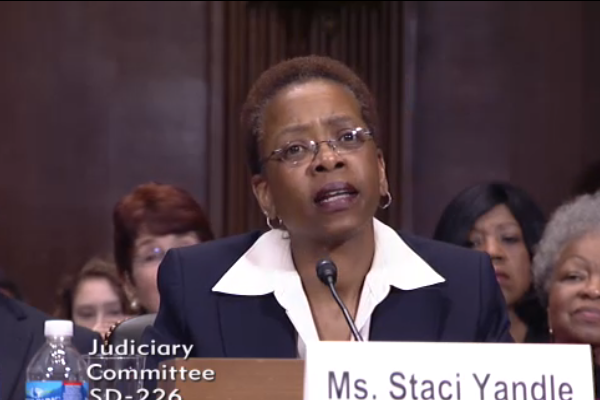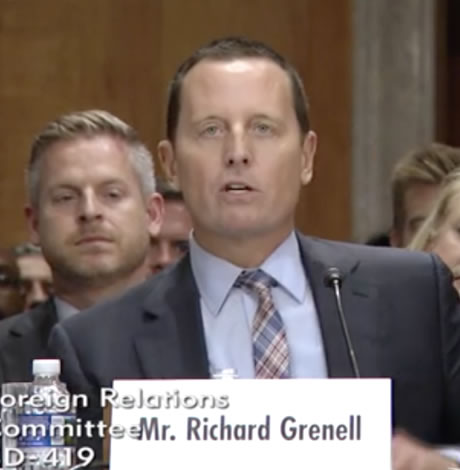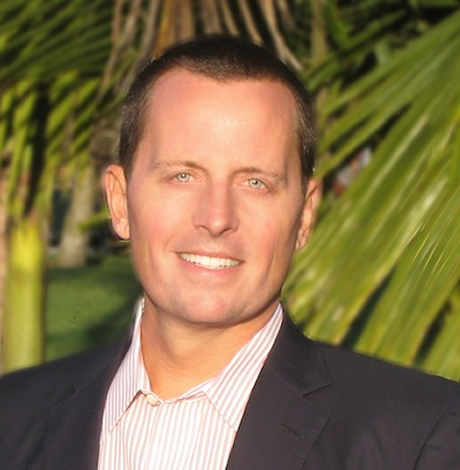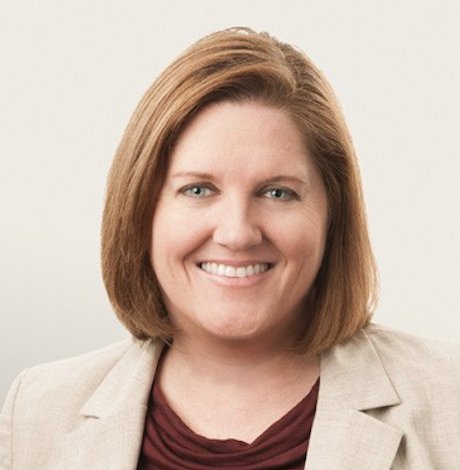News
Lesbian judicial nominee sails through hearing
Yandle would be first out black lesbian confirmed under Obama admin


Lesbian judicial nominee Staci Yandle sailed through confirmation hearing (Screenshot via U.S. Senate).
A lesbian judicial nominee to the federal bench sailed through her confirmation hearing on Wednesday, receiving only two questions that came from the U.S. senator who recommended her to the court.
Staci Michelle Yandle, whom President Obama nominated for a seat on the U.S. District Court for the Southern District of Illinois in January, testified before the Senate Judiciary Committee as part of a group of five judicial nominees. Sen. Amy Klobuchar (D-Minn.) presided over the hearing.
Sen. Richard Durbin (D-Ill.), who recommended the Yandle nomination, reflected on her work as an attorney representing “the little guy,” saying that’s what he found attractive about her career.
But Durbin asked if she agrees with a statement from U.S. Chief Justice John Roberts that if the U.S. Constitution says the little guy wins, he wins, but if the Constitution says the big guy wins, he wins.
“I think his statement is absolutely correct,” Yandle replied. “And I think that’s the proper role of a district court judge. It would be certainly what I would value as well. Based on my years of experience, as you mentioned, senator, trying cases on behalf of plaintiffs, it has given me actually a keen appreciation for the importance of impartiality and judicial integrity.”
Durbin also asked her to comment on the Tenth Amendment, which affords powers not enumerated in the U.S. Constitution to the states. Yandle said she hasn’t engaged in analysis of that amendment, but would defer to Supreme Court precedent on the matter.
According to a bio provided by the White House, Yandle has served as a solo practitioner in southern Illinois since 2007, where she focused her practice on civil litigation in federal and state court. She received a rating of “unanimously qualified” from the American Bar Association.
In her introductory remarks, Yandle recognized both her mother and sister, who were present with her in the hearing room, as well as her deceased father, Robert Yandle, whom she says continues to serve as an inspiration.
If approved by the Senate, Yandle would be the first openly lesbian black judicial nominee to receive confirmation during the Obama administration. She’d also be the first openly LGBT person to serve on the federal bench in Illinois.
But Yandle wouldn’t be the first openly lesbian black person confirmed. That distinction belongs to Deborah Batts, who was confirmed to the federal court in New York during the Clinton administration.
Introducing Yandle prior to the questioning, Durbin noted the “historic” nature of her potential confirmation to the federal bench.
“In short, Staci Yandle’s confirmation marks another important milestone in the journey toward equality of opportunity for all Americans,” Durbin said.
South America
Argentina government dismisses transgender public sector employees
Country’s Trans Labor Quota Law enacted in 2021

Protests have broken out across Argentina in recent weeks after the dismissal of transgender people from their government jobs.
President Javier Milei’s action is in stark contract with the progress seen in 2023, where the government’s hiring of trans people increased by 900 percent within the framework of the Trans Labor Quota Law that had been in place since 2021.
Among those affected is Sofia Diaz, a “survivor” who shared her testimony with the Washington Blade hours after she traveled from Chaco Province to Buenos Aires to protest her dismissal.
Presentes, an LGBTQ news agency, reported the government dismissed more than 85 trans employees in less than two weeks.
Diaz, 49, holds a degree in combined arts. She joined the National Social Security Administration (ANSES) in 2022 under the Trans Labor Inclusion Law. The layoffs began in January and left many people feeling uncertain and anguished. It was her turn a few days ago.
Diaz in an interview recounted how the situation became progressively more complicated, with difficulties in accessing information about her employment status and the eventual confirmation of dismissals through WhatsApp messages. This government action, according to Diaz, violates the law.
“We were on a Friday, I think on March 24, in the office and we have a WhatsApp group of other colleagues from all over Argentina who entered through the trans labor quota and they tell us if we can get our pay stubs on the intranet,” Diaz recalled. “So, I tried to enter, I could not, I talked to two other colleagues and they told me no, they could not, and so we went to another person. He couldn’t either.”
“Some people told us that it could be a system error. Well, we were never calm, let’s say not how this issue of installing fear and the perversion with which they do it ends,” she added. “This sadism of … inflicting pain and speculating with your misfortune and so on … is something that characterizes Javier Milei’s government.”
Diaz recalled a list of those dismissed from the agency began to circulate from the union in the afternoon. A colleague passed it on to her, “and well, unfortunately I was also on that list.”
“At that moment the whole weekend went by with anguish, crying, and talking with other colleagues from other places, not only trans, but everyone, everyone and everyone,” she said. “On Monday when we went to try to enter, we could not enter with the biometric, which is the thumb we had to use every morning to enter.”
Despite the difficult moment through which she is going, the trans activist stressed to the Blade that she will continue protesting and will even sue the government because her dismissal is illegal and “violates the constitution itself.”
The LGBTQ community and its allies have mobilized and organized demonstrations, highlighting the importance of defending the rights won and fighting against discrimination and exclusion. Diaz emphasized the fight is not only for the people affected today, but also for future generations, saying the historical memory of the struggles for inclusion and social justice must be kept alive.
“The Argentine government thus faces a key challenge in human and labor rights, where public pressure and social mobilization can play a determining role in protecting the rights of LGBTQ+ people,” Diaz said.
District of Columbia
Catching up with the asexuals and aromantics of D.C.
Exploring identity and finding community

There was enough commotion in the sky at the Blossom Kite Festival that bees might have been pollinating the Washington Monument. I despaired of quickly finding the Asexuals and Aromantics of the Mid-Atlantic—I couldn’t make out a single asexual flag among the kites up above. I thought to myself that if it had been the Homosexuals of the Mid-Atlantic I would’ve had my gaydar to rely on. Was there even such a thing as ace-dar?
As it turned out, the asexual kite the group had meant to fly was a little too pesky to pilot. “Have you ever used a stunt kite?” Bonnie, the event organizer asked me. “I bought one. It looked really cool. But I can’t make it work.” She sighed. “I can’t get the thing six feet off the ground.” The group hardly seemed to care. There was caramel popcorn and cookies, board games and head massages, a game of charades with more than its fair share of Pokémon. The kites up above might as well have been a coincidental sideshow. Nearly two dozen folks filtered in and out of the picnic throughout the course of the day.
But I counted myself lucky that Bonnie picked me out of the crowd. If there’s such a thing as ace-dar, it eludes asexuals too. The online forum for all matters asexual, AVEN, or the Asexual Visibility and Education Network, is filled with laments: “I don’t think it’s possible.” “Dude, I wish I had an ace-dar.” “If it exists, I don’t have it.” “I think this is just like a broken clock is right twice a day type thing.” What seems to be a more common experience is meeting someone you just click with—only to find out later that they’re asexual. A few of the folks I met described how close childhood friends of theirs likewise came out in adulthood, a phenomenon that will be familiar to many queer people. But it is all the more astounding for asexuals to find each other this way, given that asexual people constitute 1.7% of sexual minorities in America, and so merely .1% of the population at large.
To help other asexuals identify you out in the world, some folks wear a black ring on their middle finger, much as an earring on the right ear used to signify homosexuality in a less welcoming era. The only problem? The swinger community—with its definite non-asexuality—has also adopted the signal. “It’s still a thing,” said Emily Karp. “So some people wear their ace rings just to the ace meet-ups.” Karp has been the primary coordinator for the Asexuals and Aromantics of the Mid-Atlantic (AAMA) since 2021, and a member of the meet-up for a decade. She clicked with the group immediately. After showing up for a Fourth of July potluck in the mid-afternoon, she ended up staying past midnight. “We played Cards against Humanity, which was a very, very fun thing to do. It’s funny in a way that’s different than if we were playing with people that weren’t ace. Some of the cards are implying, like, the person would be motivated by sex in a way that’s absurd, because we know they aren’t.”
Where so many social organizations withered during the pandemic, the AAMA flourished. Today, it boasts almost 2,000 members on meetup.com. Karp hypothesized that all the social isolation gave people copious time to reflect on themselves, and that the ease of meeting up online made it convenient as a way for people to explore their sexual identity and find community. Online events continue to make up about a third of the group’s meet-ups. The format allows people to participate who live farther out from D.C. And it allows people to participate at their preferred level of comfort: while many people participate much as they would at an in-person event, some prefer to watch anonymously, video feed off. Others prefer to participate in the chat box, though not in spoken conversation.
A recent online event was organized for a discussion of Rhaina Cohen’s book, “The Other Significant Others,” published in February. Cohen’s book discusses friendship as an alternative model for “significant others,” apart from the romantic model that is presupposed to be both the center and goal of people’s lives. The AAMA group received the book with enthusiasm. “It literally re-wired my brain,” as one person put it. People discussed the importance of friendship to their lives, and their difficulties in a world that de-prioritized friendship. “I can break up with a friend over text, and we don’t owe each other a conversation,” one said. But there was some disagreement when it came to the book’s discussion of romantic relationships. “It relegates ace relationships to the ‘friend’ or ‘platonic’ category, to the normie-reader,” one person wrote in the chat. “Our whole ace point is that we can have equivalent life relationships to allo people, simply without sex.” (“Allo” is shorthand for allosexual or alloromantic, people who do experience sexual or romantic attraction.)
The folks of the AAMA do not share a consensus on the importance of romantic relationships to their lives. Some asexuals identify as aromantic, some don’t. And some aromantics don’t identify as asexual, either. The “Aromantic” in the title of the group is a relatively recent addition. In 2017, the group underwent a number of big changes. The group was marching for the first time in D.C. Pride, participating in the LGBTQ Creating Change conference, and developing a separate advocacy and activism arm. Moreover, the group had become large enough that discussions were opened up into forming separate chapters for D.C., Central Virginia, and Baltimore. During those discussions, the group leadership realized that aromantic people who also identified as allosexual didn’t really have a space to call their own. “We were thinking it would be good to probably change the name of the Meetup group,” Emily said. “But we were not 100% sure. Because [there were] like 1,000 people in the group, and they’re all aces, and it’s like, ‘Do you really want to add a non-ace person?’” The group leadership decided to err on the side of inclusion. “You know, being less gatekeep-y was better. It gave them a place to go — because there was nowhere else to go.”
The DC LGBT Center now sponsors a support group for both asexuals and aromantics, but it was formed just a short while ago, in 2022. The founder of the group originally sought out the center’s bisexual support group, since they didn’t have any resources for ace folks. “The organizer said, you know what, why don’t we just start an ace/aro group? Like, why don’t we just do it?” He laughed. “I was impressed with the turnout, the first call. It’s almost like we tapped into, like, a dam. You poke a hole in the dam, and the water just rushes out.” The group has a great deal of overlap with the AAMA, but it is often a person’s first point of contact with the asexual and aromantic community in D.C., especially since the group focuses on exploring what it means to be asexual. Someone new shows up at almost every meeting. “And I’m so grateful that I did,” one member said. “I kind of showed up and just trauma dumped, and everyone was really supportive.”
Since the ace and aro community is so small, even within the broader queer community, ace and aro folks often go unrecognized. To the chagrin of many, the White House will write up fact sheets about the LGBTQI+ community, which is odd, given that when the “I” is added to the acronym, the “A” is usually added too. OKCupid has 22 genders and 12 orientations on its dating website, but “aromantic” is not one of them — presumably because aromantic people don’t want anything out of dating. And since asexuality and aromanticism are defined by the absence of things, it can seem to others like ace and aro people are ‘missing something.’ One member of the LGBT center support group had an interesting response. “The space is filled by… whatever else!” they said. “We’re not doing a relationship ‘without that thing.’ We’re doing a full scale relationship — as it makes sense to us.”
CJ Higgins is a postdoctoral fellow with the Alexander Grass Humanities Institute at Johns Hopkins University.
Politics
After Biden signs TikTok ban its CEO vows federal court battle
“Rest assured, we aren’t going anywhere,” CEO said

President Joe Biden signed an appropriations bill into law on Wednesday that provides multi-billion dollar funding and military aid for Ukraine, Israel, and Taiwan after months of delay and Congressional infighting.
A separate bill Biden signed within the aid package contained a bipartisan provision that will ban the popular social media app TikTok from the United States if its Chinese parent company ByteDance does not sell off the American subsidiary.
Reacting, TikTok CEO Shou Zi Chew said Wednesday that the Culver City, Calif.-based company would go to court to try to remain online in the U.S.
In a video posted on the company’s social media accounts, Chew denounced the potential ban: “Make no mistake, this is a ban, a ban of TikTok and a ban on you and your voice,” Chew said. “Rest assured, we aren’t going anywhere. We are confident and we will keep fighting for your rights in the courts. The facts and the constitution are on our side, and we expect to prevail,” he added.
Our response to the TikTok Ban Bill in the US: https://t.co/LpoE67sxHo
— TikTokComms (@TikTokComms) April 24, 2024
White House Press Secretary Karine Jean-Pierre adamantly denied during a press briefing on Wednesday that the bill constitutes a ban, reiterating the administration’s hope that TikTok will be purchased by a third-party buyer and referencing media reports about the many firms that are interested.
Chew has repeatedly testified in both the House and Senate regarding ByteDance’s ability to mine personal data of its 170 million plus American subscribers, maintaining that user data is secure and not shared with either ByteDance nor agencies of the Chinese government. The testimony failed to assuage lawmakers’ doubts.
In an email, the former chair of the House Intelligence Committee, U.S. Rep. Adam Schiff (D-Calif.), who doesn’t support a blanket ban of the app, told the Washington Blade:
“As the former chairman of the House Intelligence Committee, I have long worked to safeguard Americans’ freedoms and security both at home and abroad. The Chinese Communist Party’s ability to exploit private user data and to manipulate public opinion through TikTok present serious national security concerns. For that reason, I believe that divestiture presents the best option to preserve access to the platform, while ameliorating these risks. I do not support a ban on TikTok while there are other less restrictive means available, and this legislation will give the administration the leverage and authority to require divestiture.”
A spokesperson for U.S. Sen. Alex Padilla (D-Calif.) told the Blade: “Senator Padilla believes we can support speech and creativity while also protecting data privacy and security. TikTok’s relationship to the Chinese Communist Party poses significant data privacy concerns. He will continue working with the Biden-Harris administration and his colleagues in Congress to safeguard Americans’ data privacy and foster continued innovation.”
The law, which gives ByteDance 270 days to divest TikTok’s U.S. assets, expires with a January 19, 2025 deadline for a sale. The date is one day before Biden’s term is set to expire, although he could extend the deadline by three months if he determines ByteDance is making progress or the transaction faces uncertainty in a federal court.
Former President Donald Trump’s executive order in 2020, which sought to ban TikTok and Chinese-owned WeChat, a unit of Beijing-based Tencent, in the U.S., was blocked by federal courts.
TikTok has previously fought efforts to ban its widely popular app by the state of Montana last year, in a case that saw a federal judge in Helena block that state ban, citing free-speech grounds.
The South China Morning Post reported this week that the four-year battle over TikTok is a significant front in a war over the internet and technology between Washington and Beijing. Last week, Apple said China had ordered it to remove Meta Platforms’s WhatsApp and Threads from its App Store in China over Chinese national security concerns.
A spokesperson for the ACLU told the Blade in a statement that “banning or requiring divestiture of TikTok would set an alarming global precedent for excessive government control over social media platforms.”
LGBTQ TikToker users are alarmed, fearing that a ban will represent the disruption of networks of support and activism. However, queer social media influencers who operate on multiple platforms expressed some doubts as to long term impact.
Los Angeles Blade contributor Chris Stanley told the Blade:
“It might affect us slightly, because TikTok is so easy to go viral on. Which obviously means more brand deals, etc. However they also suppress and shadow ban LGBTQ creators frequently. But we will definitely be focusing our energy more on other platforms with this uncertainty going forward. Lucky for us, we aren’t one trick ponies and have multiple other platforms built.”
Brooklyn, N.Y.,-based gay social media creator and influencer Artem Bezrukavenko told the Blade:
“For smart creators it won’t because they have multiple platforms. For people who put all their livelihood yes. Like people who do livestreams,” he said adding: “Personally I’m happy it gets banned or American company will own it so they will be less homophobic to us.”
TikTok’s LGBTQ following has generally positive experiences although there have been widely reported instances of users, notably transgender users, seemingly targeted by the platform’s algorithms and having their accounts banned or repeatedly suspended.
Of greater concern is the staggering rise in anti-LGBTQ violence and threats on the platform prompting LGBTQ advocacy group GLAAD, in its annual Social Media Safety Index, to give TikTok a failing score on LGBTQ safety.
Additional reporting by Christopher Kane
-

 State Department3 days ago
State Department3 days agoState Department releases annual human rights report
-

 Maryland4 days ago
Maryland4 days agoJoe Vogel campaign holds ‘Big Gay Canvass Kickoff’
-

 Politics3 days ago
Politics3 days agoSmithsonian staff concerned about future of LGBTQ programming amid GOP scrutiny
-

 District of Columbia19 hours ago
District of Columbia19 hours agoCatching up with the asexuals and aromantics of D.C.








